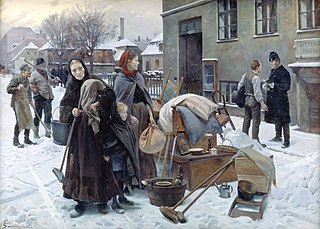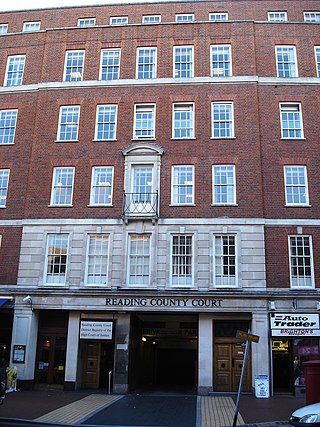Related Research Articles

Copyhold was a form of customary land ownership common from the Late Middle Ages into modern times in England. The name for this type of land tenure is derived from the act of giving a copy of the relevant title deed that is recorded in the manorial court roll to the tenant; not the actual land deed itself. The legal owner of the manor land remained the mesne lord, who was legally the copyholder, according to the titles and customs written down in the manorial roll. In return for being given land, a copyhold tenant was required to carry out specific manorial duties or services. The specific rights and duties of copyhold tenants varied greatly from one manor to another and many were established by custom. By the 19th century, many customary duties had been replaced with the payment of rent.
Escheat is a common law doctrine that transfers the real property of a person who has died without heirs to the crown or state. It serves to ensure that property is not left in "limbo" without recognized ownership. It originally applied to a number of situations where a legal interest in land was destroyed by operation of law, so that the ownership of the land reverted to the immediately superior feudal lord.

A landlord is the owner of a house, apartment, condominium, land, or real estate which is rented or leased to an individual or business, who is called a tenant. When a juristic person is in this position, the term landlord is used. Other terms include lessor and owner. The term landlady may be used for the female owners. The manager of a pub in the United Kingdom, strictly speaking a licensed victualler, is referred to as the landlord/landlady. In political economy it refers to the owner of natural resources alone from which an economic rent, a form of passive income, is the income received.

Eviction is the removal of a tenant from rental property by the landlord. In some jurisdictions it may also involve the removal of persons from premises that were foreclosed by a mortgagee.
Adverse possession, sometimes colloquially described as "squatter's rights", is a legal principle in the Anglo-American common law under which a person who does not have legal title to a piece of property—usually land —may acquire legal ownership based on continuous possession or occupation of the property without the permission (licence) of its legal owner. The possession by a person is not adverse if they are in possession as a tenant or licensee of the legal owner.

Lord of the manor is a title that, in Anglo-Saxon England, referred to the landholder of a rural estate. The lord enjoyed manorial rights as well as seignory, the right to grant or draw benefit from the estate. The title continues in modern England and Wales as a legally recognised form of property that can be held independently of its historical rights. It may belong entirely to one person or be a moiety shared with other people.

A lease is a contractual arrangement calling for the user to pay the owner for the use of an asset. Property, buildings and vehicles are common assets that are leased. Industrial or business equipment are also leased. Basically a lease agreement is a contract between two parties: the lessor and the lessee. The lessor is the legal owner of the asset, while the lessee obtains the right to use the asset in return for regular rental payments. The lessee also agrees to abide by various conditions regarding their use of the property or equipment. For example, a person leasing a car may agree to the condition that the car will only be used for personal use.
A leasehold estate is an ownership of a temporary right to hold land or property in which a lessee or a tenant holds rights of real property by some form of title from a lessor or landlord. Although a tenant does hold rights to real property, a leasehold estate is typically considered personal property.

Quia Emptores is a statute passed by the Parliament of England in 1290 during the reign of Edward I that prevented tenants from alienating their lands to others by subinfeudation, instead requiring all tenants who wished to alienate their land to do so by substitution. The statute, along with its companion statute Quo Warranto also passed in 1290, was intended to remedy land ownership disputes and consequent financial difficulties that had resulted from the decline of the traditional feudal system in England during the High Middle Ages. The name Quia Emptores derives from the first two words of the statute in its original mediaeval Latin, which can be translated as "because the buyers". Its long title is A Statute of our Lord The King, concerning the Selling and Buying of Land. It is also cited as the Statute of Westminster III, one of many English and British statutes with that title.

A mesne lord was a lord in the feudal system who had vassals who held land from him, but who was himself the vassal of a higher lord. Owing to Quia Emptores, the concept of a mesne lordship technically still exists today: the partitioning of the lord of the manor's estate among co-heirs creating the mesne lordships.
Ejectment is a common law term for civil action to recover the possession of or title to land. It replaced the old real actions and the various possessory assizes where boundary disputes often featured. Though still used in some places, the term is now obsolete in many common law jurisdictions, in which possession and title are sued by the actions of eviction and quiet title, respectively.
Waste is a term used in property law to describe a cause of action that can be brought in court to address a change in condition of real property brought about by a current tenant that damages or destroys the value of that property. A lawsuit for waste can be brought against a life tenant or lessee of a leasehold estate, either by a current landlord or by the owner of a vested future interest. The holder of an executory interest, however, has no standing to enforce an action for waste, since his future interest is not vested. There are several different kinds of waste under the law.
An action to quiet title is a lawsuit brought in a court having jurisdiction over property disputes, in order to establish a party's title to real property, or personal property having a title, of against anyone and everyone, and thus "quiet" any challenges or claims to the title.

The Law of Property Act 1925 is a statute of the United Kingdom Parliament. It forms part of an interrelated programme of legislation introduced by Lord Chancellor Lord Birkenhead between 1922 and 1925. The programme was intended to modernise the English law of real property. The Act deals principally with the transfer of freehold or leasehold land by deed.

An assured tenancy is a legal category of residential tenancy to an individual in English land law. Statute affords a tenant under an assured tenancy a degree of security of tenure. A tenant under an assured tenancy may not be evicted without a reasonable ground in the Housing Act 1988 and, where periodic changes in rent are potentially subject to a challenge before a rent assessment committee.
The history of English land law can be traced back to Roman times. Throughout the Early Middle Ages, where England came under rule of post-Roman chieftains and Saxon monarchs, land was the dominant source of personal wealth. English land law transformed further from the Saxon days, particularly during the post-Norman Invasion feudal encastellation and the Industrial Revolution. As the political power of the landed aristocracy diminished and modern legislation increasingly made land a social form of wealth, subject to extensive social regulation such as for housing, national parks, and agriculture.
Green v. Biddle, 1 U.S. 1 (1823), is a 6-to-1 ruling by the Supreme Court of the United States that held that the state of Virginia had properly entered into a compact with the United States federal government under Clause One of Article Four of the United States Constitution. This compact surrendered Virginia's claim to the area that eventually became the state of Kentucky, but imposed restrictions on Kentucky's ability to upset title to land sold or otherwise granted by the state of Virginia at the time of the compact. The Supreme Court held that legislation enacted by Kentucky that restricted these rights unconstitutionally infringed on Virginia's right to surrender the land in accordance with Article Four, Clause One.

English land law is the law of real property in England and Wales. Because of its heavy historical and social significance, land is usually seen as the most important part of English property law. Ownership of land has its roots in the feudal system established by William the Conqueror after 1066, and with a gradually diminishing aristocratic presence, now sees a large number of owners playing in an active market for real estate.

National Provincial Bank Ltd v Ainsworth [1965] is an English land law and family law case, concerning the quality of a person's interest in a home when people live together, as well as licenses in land.
Ropaigealach v Barclays Bank plc [2000] QB 263 is an English land law case, concerning mortgage arrears and a rare mortgage over a family home which had a right to enter a home and sell it without a court order.
References
- ↑ Smith, John William. An Elementary View of the Proceedings in an Action at Law. London: Stevens & Sons, 1873, p. 432-433.
- 1 2 3 Farran, Sue and Paterson, Donald. South Pacific Property Law. Florence, Ky.: Routledge, 2004, p. 90.
- ↑ Corpus Juris Secundum: A Complete Restatement of the Entire American Law as Developed by All Reported Cases. St. Paul, Minn.: Thomson/West, 1974, p. 163.
- ↑ Smith, An Elementary View of the Proceedings in an Action at Law, 1873, p. 433.
- ↑ See, for example, Winchester v. Stevens Point, 58 Wis. 350, 17 N.W. 3 (Wis.1883).